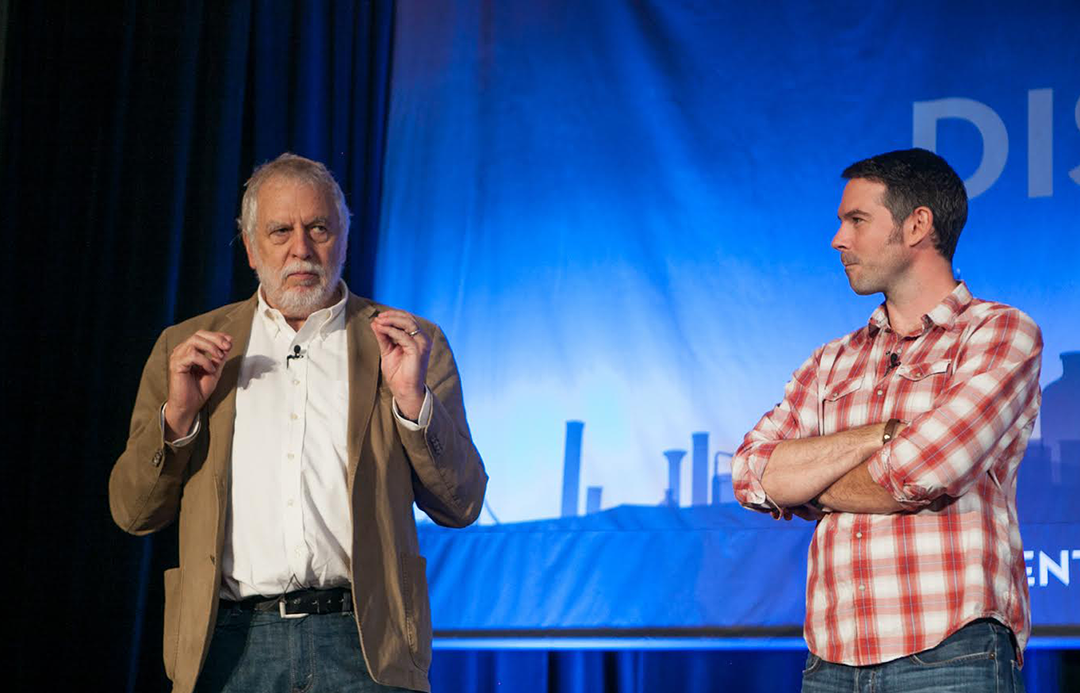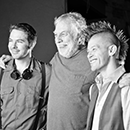The smell of popcorn and churros fill the air as contact jugglers roll crystal balls along their arms, and roving carnies serenade the crowd with accordion and fiddle music. At a glance, it is a carnival in the oldest sense of the word, but just beyond the fire breathers and acrobats are demonstrations of the Oculus Rift virtual reality headsets, a maze composed of green laser beams, and a pair of pint-sized robots dancing to “Gangnam Style.” The STEAM (Science, Technology, Engineering, Art, Mathematics) Carnival is a hybrid of traditional entertainment and cutting-edge science; its inaugural event in October drew more than 15,000 curious attendees to CRAFTED at the Port of Los Angeles.
Hosted by the LA-based entertainment company Two Bit Circus, the Carnival was—like almost everything Two Bit does—a beta run for the real deal. “Now that we know what worked and what didn’t work, the next step is to take the show to other cities,” CEO Brent Bushnell says. “Our goal is to show kids that being a professional nerd can be cool and exciting.”
Long associated with pocket protectors and social awkwardness, STEM-related fields (Science, Technology, Engineering, Math) have suffered from what Bushnell and his co-founder and CTO Eric Gradman call a cultural-branding problem. “The reality is that whole image just isn’t true anymore,” Gradman explains. “The tools to build exciting, new things are accessible and easy to use, and inventions can be up and running really fast.”
Building cool stuff and putting it in front of people is something Bushnell and Gradman have been doing for years. Bushnell’s father, Nolan, is famous for founding the video game company Atari in 1972, and the pizza/arcade chain Chuck E. Cheese’s in 1977. While it seems only natural that his son would continue the tradition of interactive games and entertainment, it wasn’t always so obvious to Brent.
“If you have a successful dad, your impulse is to strike out on your own, so I went into all sorts of other industries: restaurants, aftermarket insurance, fiber optics, systems administration—then I accidentally rediscovered games and was like ‘Oh my God, what have I been doing? This is so much better!’” A former carney himself, Nolan Bushnell not only approves of his son’s current career choice, but occasionally visits and talks to the team. “He keeps threatening to move in here!” Bushnell laughs.

Bushnell originally connected with Gradman through a group of friends competing in a monthly event called “Mindshare” in Downtown LA. “It started as a drinking club with an inventing problem,” he offers wryly. “It was awesome because it was accommodating of things that were prototypes or in early development, and every month we’d have a test audience to give us feedback.”
Their first collaboration was a project called “Artfall,” which consisted of an ordinary whiteboard that had a camera and a projector pointed at it. Animated objects would appear to ‘fall’ from the top of the whiteboard and viewers could control the falling object’s path by drawing on the board using a regular dry erase marker. The friends went on to form a collective called Syyn Labs, which gained mainstream fame in 2010 when they constructed a warehouse-sized Rube Goldberg machine for a music video for the band OK Go.
“Suddenly we were getting calls from Madison Avenue wanting us to make viral videos for them, too,” Gradman tells us. “But we also had teachers and parents calling us and saying, ‘Hey, we used that video in our physics class and the kids were really inspired, so we made our own—and here’s a video!’ ” Gradman and Bushnell realized something about their approach was getting through to kids at a time when the United States ranked 52nd in the world in science and math. That inspiration would eventually lead them to create the STEAM Carnival, but at the time they were simply looking for an opportunity to share their love of innovation with a young audience.
In 2011 they got what seemed like a promising break when the two represented Syyn Labs on ABC’s Extreme Makeover: Home Edition as the on-camera technology designers. In each episode, they’d build something for that week’s homeowner, from digital puppets to a pitching machine controlled by a sip-puff device. But the show wrapped its final season later that year, and the two decided to move on from Syyn Labs to form Two Bit Circus, where they could continue to innovate organically.

The break from Syyn allowed what had started out a group of entrepreneurs to grow as a company. “One of the things we learned was that some amount of hierarchy is important,” says Gradman. “We went from a group of friends, to a collective, to a company, and it took that reset to get everyone’s roles straight.”
Two Bit can best be described as an entertainment company, with events such as STEAM Carnival as its productions. Bushnell and Gradman hope to explore a wide variety of areas, mostly in the area of out-of-home entertainment: immersive theater, spectacular stage productions, and novel dining. “There are people that compete on individual things that we do,” Gradman explains, “but we’re doing a bunch of different things and tying them together in a way that’s unique. Our secret sauce is our creativity.”
Two Bit maintains several lines of business: rentals, where they bring their high-tech games and performances to events hosted by companies such as Intel and Amazon; content, particularly video content, such as finding ways to allow people to engage in an event remotely; and consulting, where they advise companies like Verizon and Dave and Buster’s on how to maximize their branded experiences. “The best way to look at it is: if you’re not Disney and you need something like Imagineering, where do you go?” says Bushnell.
Far from viewing companies such as Disney as competitors, Gradman and Bushnell see Los Angeles’ particular blend of tech and entertainment industry inspiring. “It’s such an awesome time to be working at a tech-related company in Los Angeles – that whole community is organized, the startup community is organized, it’s really a vibrant ecosystem.” The numbers back up that sentiment: according to a report released by the research group Startup Genome, LA ranks third in the world in tech investment – just behind San Francisco and Tel Aviv.
Bushnell and Gradman see LA as a kind of perfect storm for left and right-brained talent to collaborate, thus the addition of “art” to change “STEM” to “STEAM.” Though both come from tech backgrounds, the pair agree that the skill sets they consider most valuable are diversified. “I want TV and movie producers, prop makers, welders, roboticists, seamstresses, actors, scriptwriters, and storytellers,” says Bushnell. “A lot of the talent fueling Hollywood fits well with Two Bit’s creative goals. You won’t learn that lesson in Silicon Valley, but you’ll learn it here in LA.”














































